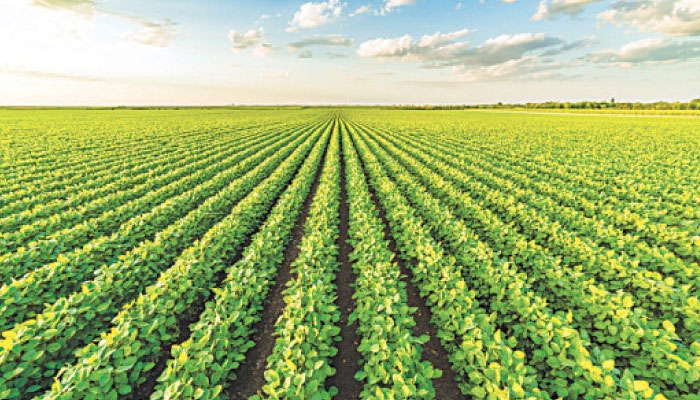Rs41.3 billion proposed for agriculture sector’s interventions
ISLAMABAD: The government has proposed Rs41.3 billion block allocation under the next fiscal year’s budget for agriculture sector interventions that are expected to bring double-digit increase yields of major crops, The News learnt on Wednesday.
Of the total allocations, Rs21.3 billion is for development and Rs20 billion for non-development expenditures.
The allocation, under the agriculture transformation plan, aimed at improving warehousing with Rs8 billion spending, genetic improvement in cattle projects (Rs1.1bln), revision for mechanisation (Rs1.2bln), shrimp farming (Rs1bln), construction of silos (Rs5bln), fertiliser subsidy (Rs12bln) and cotton procurement by Trading Corporation of Pakistan (Rs9bln), according to an official document. The proposed interventions are expected to increase wheat yields by 41 percent, rice (40pc), cotton (65pc), maize (40pc), sugarcane (22pc) and other crops (30pc).
Currently, average yield per acre for wheat in Pakistan is 29 maunds compared to 51 maunds in India. Likewise, the average yields of rice (50 maunds) and sugarcane (656 maunds) are lower than 64 and 796 in India, according to the document. For maize per acre yield is 57 maunds compared to 42, while cotton yield per acre is same an average 18 maunds.
The government constituted a subgroup of Economic Advisory Council to review the proposed agriculture transformation plan, propose changes and advise on implementation to ensure food security , help build commodity warehouses and cold storage chains, propose measures to reduce and stabilize domestic agriculture prices and targeting of food subsidies, review deregulation proposals and provide a two-year plan in collaboration with the federal government and provinces, recommend measures to reduce farm to market access, reduction of the role of the middlemen and building of storage warehouses, propose restructuring and change of economics of Pakistan Agriculture Storage and Services Corporation, Trading Corporation of Pakistan, and provincial food departments, proposed measures to reduce commodity debt, and build strategic reserves for 4 to 5 key commodities. The council’s subgroup proposed immediate interventions, including seed sector reforms, digital subsidy mechanism, mechanization, water efficiency, access to credit, revamping extension services, post-harvest storage and restructuring research institutions with targeted sectors including cotton revival, olive, soybean, palm production, genetic improvement in livestock and fisheries.
Parallel interventions under food security innovation fund include agro ecological zoning, international cooperation, value chain development, food and vegetable clusters, storage of perishable produce, land consolidation, organic farming, sub-montane agriculture, horizontal expansion, and food processing.
The government is expected to share half cost of $110 million of genetic improvement cattle. The benefit is estimated at $11.1 billion in milk and $1.7 billion in meat.
-
 Google Warns Of State-sponsored Cyberattacks Targeting Defense Sector Employees
Google Warns Of State-sponsored Cyberattacks Targeting Defense Sector Employees -
 Ransom Deadline Passes: FBI Confirms ‘communication Blackout’ In Nancy Guthrie Abduction
Ransom Deadline Passes: FBI Confirms ‘communication Blackout’ In Nancy Guthrie Abduction -
 Jeff Bezos Hints At Blue Origin Moon Plans As Elon Musk Responds With Cautious Praise
Jeff Bezos Hints At Blue Origin Moon Plans As Elon Musk Responds With Cautious Praise -
 Zach Bryan Slams Turning Point USA Alternative Halftime Show: 'Embarrassing As Hell'
Zach Bryan Slams Turning Point USA Alternative Halftime Show: 'Embarrassing As Hell' -
 South Korea Blames Coupang Data Breach On 'management Failures,' Not Cyber Attack
South Korea Blames Coupang Data Breach On 'management Failures,' Not Cyber Attack -
 ‘Disgraced’ Andrew More Concerned About ‘issue Of His Legacy’ Than Epstein Links
‘Disgraced’ Andrew More Concerned About ‘issue Of His Legacy’ Than Epstein Links -
 Instagram Plans New Snapchat-style App ‘Instants’ Amid Rising AR Competition
Instagram Plans New Snapchat-style App ‘Instants’ Amid Rising AR Competition -
 Safer Internet Day 2026: Is Social Media Ban The Only Way To Protect Kids?
Safer Internet Day 2026: Is Social Media Ban The Only Way To Protect Kids? -
 Piers Morgan Finally Breaks Silence On Kidnapping Of Savannah Guthrie's Mother Nancy
Piers Morgan Finally Breaks Silence On Kidnapping Of Savannah Guthrie's Mother Nancy -
 Lenore Taylor Resigns As Guardian Australia Editor After Decade-long Tenure
Lenore Taylor Resigns As Guardian Australia Editor After Decade-long Tenure -
 'Mortified' Princess Eugenie, Beatrice Plan Interview To Finally Speak Truth In Sarah Ferguson, Andrew-Epstein Scandal
'Mortified' Princess Eugenie, Beatrice Plan Interview To Finally Speak Truth In Sarah Ferguson, Andrew-Epstein Scandal -
 Lewis Hamilton Spent Years Trying To Catch Kim Kardashian's Attention?
Lewis Hamilton Spent Years Trying To Catch Kim Kardashian's Attention? -
 Royal Strategy Revealed As King Charles, Prince William Issue Statements On Andrew Row
Royal Strategy Revealed As King Charles, Prince William Issue Statements On Andrew Row -
 Inside Will Smith's Struggle To Revive His Career After Infamous Oscar Incident
Inside Will Smith's Struggle To Revive His Career After Infamous Oscar Incident -
 What’s Coming Out Of Meghan Markle’s War Against Prince William? Inside People’s Unease
What’s Coming Out Of Meghan Markle’s War Against Prince William? Inside People’s Unease -
 Australia Seeks Urgent Meeting With Roblox Over 'Disturbing' Content Complaints
Australia Seeks Urgent Meeting With Roblox Over 'Disturbing' Content Complaints




